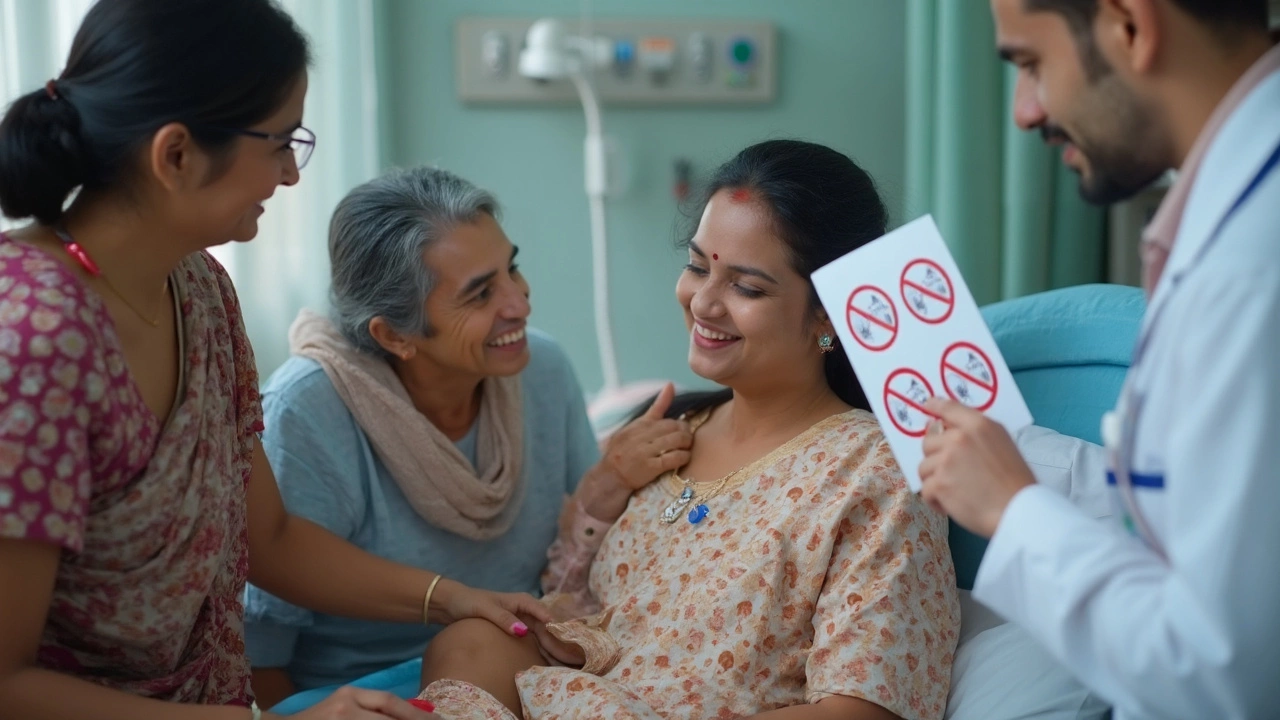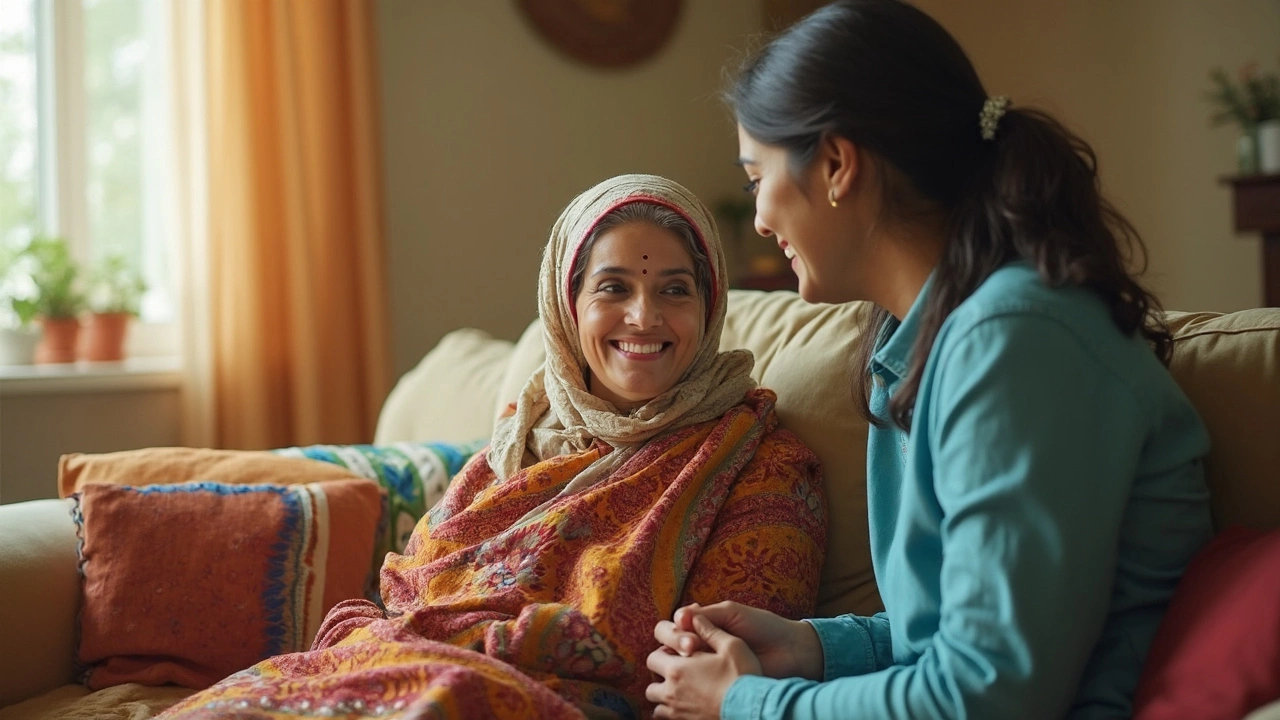If you’ve heard you shouldn’t kiss someone going through chemo, you’re probably wondering if that’s just being overcautious or if there’s actually something risky going on. Here’s the deal: chemo isn’t just brutal on cancer—it also beats down your immune system. Suddenly, every common bug hanging out in your mouth is a bigger deal than you’d think.
You know how easy it is to pick up a cold or a sore throat from a kiss, right? Now imagine that same minor sickness turning into something serious, just because your body isn’t up for the fight. Even if you’re not sick, your mouth is full of bacteria and viruses. During chemo, the body can’t handle them the way it usually does. That’s why doctors put kissing (and even sharing forks and cups) on the ‘probably not’ list until the patient’s immune system is stronger.
- What Happens to Your Immune System During Chemo?
- How Kissing Transmits Germs and Why That Matters
- Risks for Both the Patient and the Partner
- Safer Ways to Show Love and When Kissing Is Okay Again
What Happens to Your Immune System During Chemo?
So, chemo’s main job is to kill fast-growing cancer cells, but here’s the catch—it also messes with other fast-growing healthy cells, especially your white blood cells. Those white blood cells are key because they’re your main line of defense against infections. When chemo knocks them down, your immune system takes a serious hit.
Doctors actually track your white blood cells with a test called a "neutrophil count." If it drops too low (a condition called neutropenia), even a small bug or everyday germ can land you in the hospital. That’s why right in the middle of chemo, you’re in what’s called the “danger zone” for infections.
Symptoms like a mild sore throat, a sniffly nose, or a low fever that wouldn’t normally slow you down suddenly turn into possible emergencies. The immune system isn’t just weaker—it’s unreliable. Fights that used to be quick and easy now take longer, and sometimes your body misses germs completely. This risk sticks around for a while, too. Even after chemo sessions, your immune system can take weeks or months to bounce back to normal.
That’s why doctors go big on the hygiene talk: washing hands all the time, avoiding crowds, and being extra careful around anyone who might be sick. It’s not just about being cautious—it’s a real effort to keep dangerous infections away during this vulnerable stretch.
How Kissing Transmits Germs and Why That Matters
Kissing might seem harmless, but it’s actually a quick way for germs to go from one mouth to another. Saliva carries bacteria and viruses, whether you feel sick or not. Everything from the common cold to contagious viruses like herpes simplex and Epstein-Barr can pass with a simple kiss. When you throw cancer treatment into the mix, things get risky fast.
Chemo patients aren’t just a little more likely to get sick — their immune system is so worn down that it struggles to fight off even weak bugs. Here’s where it gets real: a mild infection for most people can turn into pneumonia or worse for someone on chemo. Even tiny mouth sores, which are a common chemo side effect, make it easy for bacteria to slip right into the bloodstream.
Check out how common infections can slip through just from close contact:
- Colds and flu (from airborne droplets, but also saliva)
- Herpes simplex virus (cold sores – lots of adults have it and don’t even know they’re contagious)
- Epstein-Barr virus (the one behind ‘mono’ or “kissing disease”)
- Cytomegalovirus (CMV, which healthy folks barely notice, but is dangerous for those with weak immunity)
- Streptococcal bacteria (can cause strep throat or even sepsis in severe cases)
Some numbers might help put this in perspective:
| Pathogen | How Easily Spread by Kissing? | Why It's Serious for Chemo Patients |
|---|---|---|
| Herpes Simplex | Very common | Can trigger mouth sores and spread to the bloodstream |
| Epstein-Barr (Mono) | Common | Extreme fatigue, fever, if immune is low, it can get severe fast |
| Influenza | Possible through saliva | Pneumonia risk jumps, especially during low white blood cell counts |
| Streptococcus | Less common by kiss, but possible | Infections can escalate without a strong immune response |
So, if you’re wondering if that one kiss is worth the risk — for someone on chemo, it usually isn’t. Keeping your germs to yourself is actually one of the best ways to help your loved one stay safe during treatment. It goes beyond just staying away when you’re feeling under the weather. Even without symptoms, people can spread viruses for days before realizing they’re sick. That’s why doctors are strict about no-kiss rules until those white blood cell counts bounce back.
If you want to show you care, there are plenty of safer options (a little further along, we’ll get into those). For now, just know that the immune system won’t thank you for swapping spit, even if your heart’s in the right place.

Risks for Both the Patient and the Partner
People often think about protecting the person on chemo, but there are real risks for their partners too. The main issue is how wiped out chemo leaves your immune system. Even germs and bugs that would barely bother a healthy person can cause big trouble for someone in treatment. We’re talking mouth sores turning nasty, or a simple virus leading to a hospital trip.
If you have a cold sore (herpes simplex), for example, kissing could pass the virus—and what’s usually an annoying blister could become a full-blown painful outbreak for a chemo patient. Other things like strep throat, the flu, or even a common cold get through saliva. And with a chemo-weakened body, infections can spiral quickly.
The shocker? It goes both ways. Some chemo drugs actually end up in saliva, especially during the first couple of days after treatment. That means, if you’re the partner, you could wind up with drug exposure—unlikely to cause cancer, but possible to give you mouth irritation or gut trouble if you swallow enough. No one wants that.
- Chemo patients are far more likely to get infections that healthy people shake off easily.
- Partners can pick up chemo drug traces through saliva, especially in the first 48 hours after a treatment session.
- Any recent dental work, bleeding gums, or open sores in either person’s mouth up the risk for infections to get in fast.
The bottom line? Avoiding kissing during chemo isn’t just about being careful—it's about keeping both people safe from problems that could go way beyond a sniffle or sore throat.
Safer Ways to Show Love and When Kissing Is Okay Again
Just because kissing is risky during chemo doesn’t mean you can’t show affection. People crave that feeling of closeness, especially when chemo can make things feel pretty lonely. But you’ve got safer options while the immune system is on the ropes.
Try these simple ways to keep the connection going:
- Leave sweet notes around the house or send loving texts—sometimes words say more than gestures.
- Snuggle up and watch a favorite show together. Skin-to-skin contact like hugging is usually okay unless the patient’s care team says otherwise.
- Hold hands or offer gentle massages. Touch is soothing even without a kiss.
- Go for walks together (if energy allows). Fresh air can help lift the mood for both of you.
And don’t forget, you can always talk to the treatment team. Asking what is safe and what isn’t takes out the guesswork.
When it comes to actually kissing again, here’s the lowdown—most doctors say it’s best to wait until blood counts bounce back. This usually means when the patient’s neutrophils (a type of white blood cell) are no longer dangerously low. For a lot of people, their neutrophil count is the lowest 7–14 days after chemo. This is when the immune system is at its weakest, called the "nadir." Once that phase passes and counts start climbing, the risk drops—so your team may give you the green light.
| Phase | Blood Cell Status | Kissing Safe? |
|---|---|---|
| During nadir (low point) | Very low neutrophils | No |
| Recovery phase | Counts improving | Ask doctor |
| Normal range | Stable counts | Usually safe |
If you’re itching to kiss again, make sure both of you are healthy. Mouth sores are a no-go for kissing since they open a door for bacteria. Stay away if you feel a cold coming on or have a fever. And one more heads-up: during certain chemo types, like high-dose or after stem cell transplants, the rules are even more strict—sometimes for months.
So yes, it’s a hassle, but these steps help keep things safe. Just remember, showing love isn’t just about kissing—the little things you do every day matter even more while chemo is in the picture.
Chemo makes things different for now, but connection doesn’t disappear just because kissing is off-limits for a bit.
